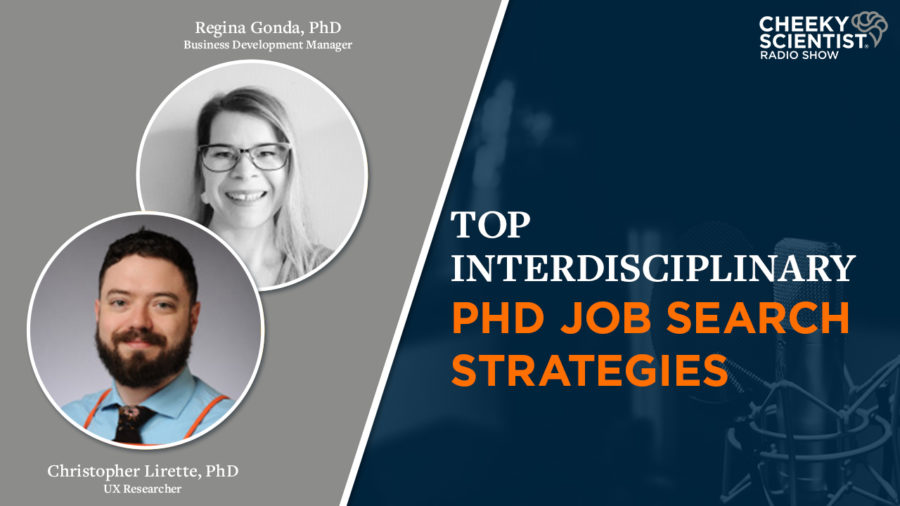Hosted By

Chief Executive Officer Cheeky Scientist

Join Isaiah, Christopher, And Regina As They Discuss The Job Search Strategies For Interdisciplinary PhDs.
Here’s a quick rundown of this week’s episode…
- First, Isaiah interviews a panel of interdisciplinary PhDs who successfully transitioned to diverse industry careers
- Next, the expert panel discusses the special skill set that interdisciplinary PhDs possess and gives them an added advantage in industry positions
- Finally, Isaiah, Christopher, and Regina explore the different career tracks available to interdisciplinary PhDs.
From This Week’s Show…
Advice From Fellow PhDs
Interdisciplinary PhDs form this umbrella term which is relatively new. Depending on your department, university, or country your PhDs may be classified as social sciences in one location and humanities in another. They often consider themselves second-class citizens when it comes to job search. But in reality, they have a special skill set that gives them an advantage over other PhDs in certain positions as User Experience Researcher.
I am an anthropologist by training but have actually worked at the intersections of social finance and the humanities. I also have a certificate in gender and race studies, and was initially trained by the humanities land team, to be a social scientist. Interdisciplinary PhD is borderless to a large extent as there are huge overlaps.
After I completed my PhD, I decided to transition and was looking into the skills that I could bring to the industry table. I felt like I had nothing to give; that my PhD was not as fruitful as a STEM PhD. Surprisingly, during my transition, I learned a lot about my own skills, experiences, and how to communicate them in a better way. Since then it has been great.
Although I was fortunate enough to have a dissertation chair who told me to imagine my position outside of academia, I suffered from imposter syndrome. I felt that I was a work in progress and was not adept enough to transition into industry. It took me long but I used my network to leverage my skill set. Working in industry taught me how valuable my transferable skills are.
The Special Skill Set That Gives Interdisciplinary PhDs An Advantage In Certain Industry Careers
I think the distress point here is if you think it is particularly bad for you, as a social scientist or human sciences, as there is even less funding there. And I think that is why we have to overcome the second class citizen mindset. It is not because you are less valuable, rather the system is more broken for certain departments.
PhDs with an interdisciplinary background possess skills like empathy, qualitative analysis, focus groups, that are different from a traditional STEM PhD.
The ability to do qualitative research about user experience or consumer behavior lies with interdisciplinary PhDs. Most of the businesses conduct problem-solving in some capacity i.e being able to figure out what you are doing and your analysis of the situation of what we call qualitative data.
Interdisciplinary PhDs are trained to employ their critical and creative thinking skills to analyze qualitative data and recognize user problems. Once the problem is identified, user experience solutions can be easily designed. I think that’s one of the most important things that I do in my job.
Ethnography is a very elaborate process involving a series of different methods that go toward the writing of a human life. But people use ethnography in industry to mean going on site to somebody’s place and doing an interview with them: this gives a lived experience in a bite-size.
I think that’s the best example of the academic training that you all have here that can be leveraged for industry, that someone coming froms traditional STEM could not do.
The Industry Career Tracks Available To Interdisciplinary PhDs
There are partial pivot and full-pivot roles for interdisciplinary PhDs.
The full-pivot positions are more of the standard for-profit industry positions, the top ones that interdisciplinary PhDs get into. A financial analyst is one of them which involves analyzing information. It does not matter whether the information is qualitative or quantitative, because you can do both.
The Financial analyst position studies the psychological and behavioral aspect of how people spend money. An economist in this position would only focus on the currency aspect that is why they need an interdisciplinary PhD. As opposed to a pure economist, you will be able to inject the human behavior element and also bring in that kind of empathy so that people are not just going to be data points. And sometimes you can have some insights that people won’t be able to have that way because of that added, perspective that you bring to it.
** for the full podcast, check out the audio player above.
To get advanced access to the full length versions of these podcasts, as well as access to our live training webinars, exclusive training videos, case studies, industry insider documents, transition plan, and private online network, get on the waitlist for the Cheeky Scientist Association now.










